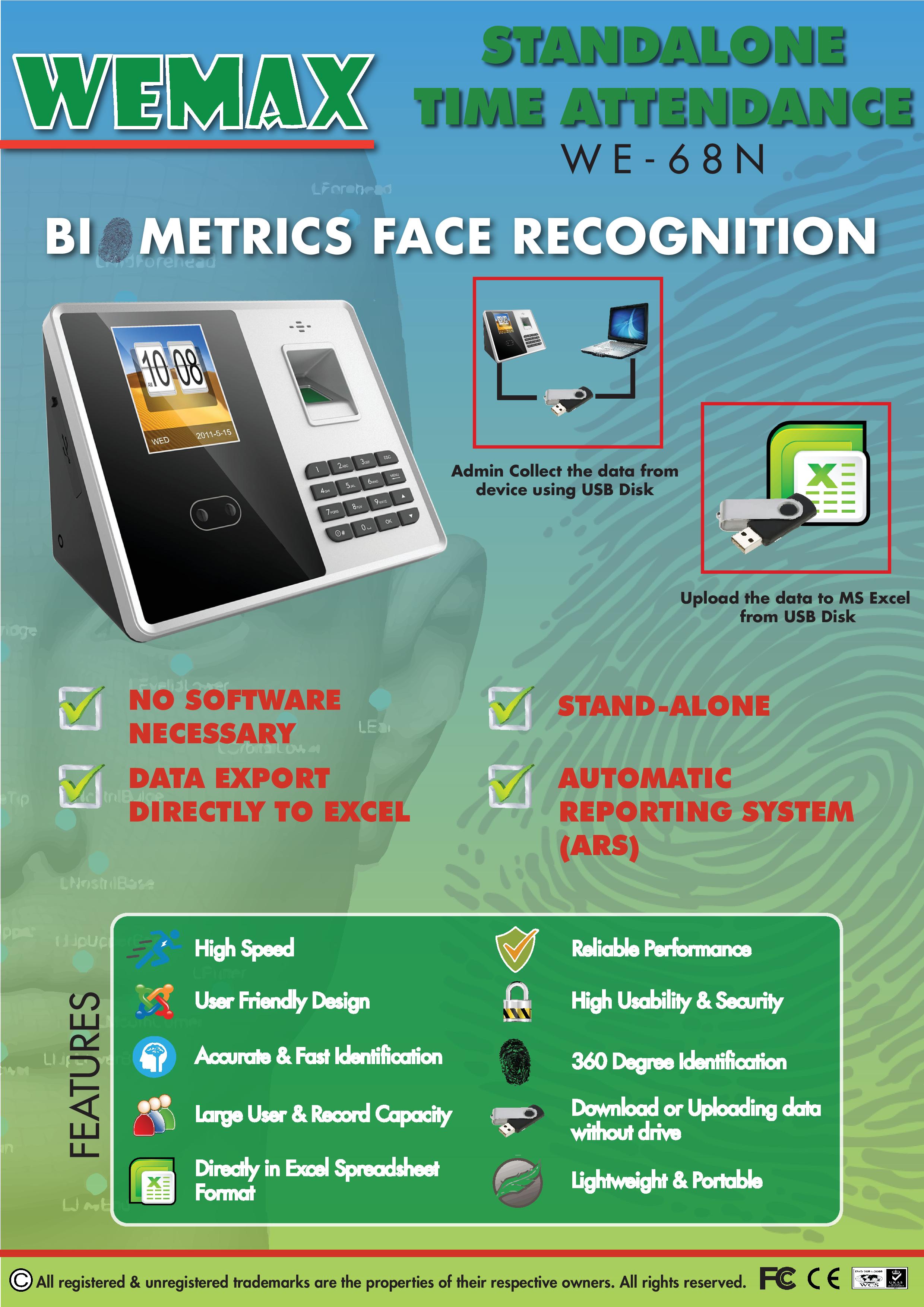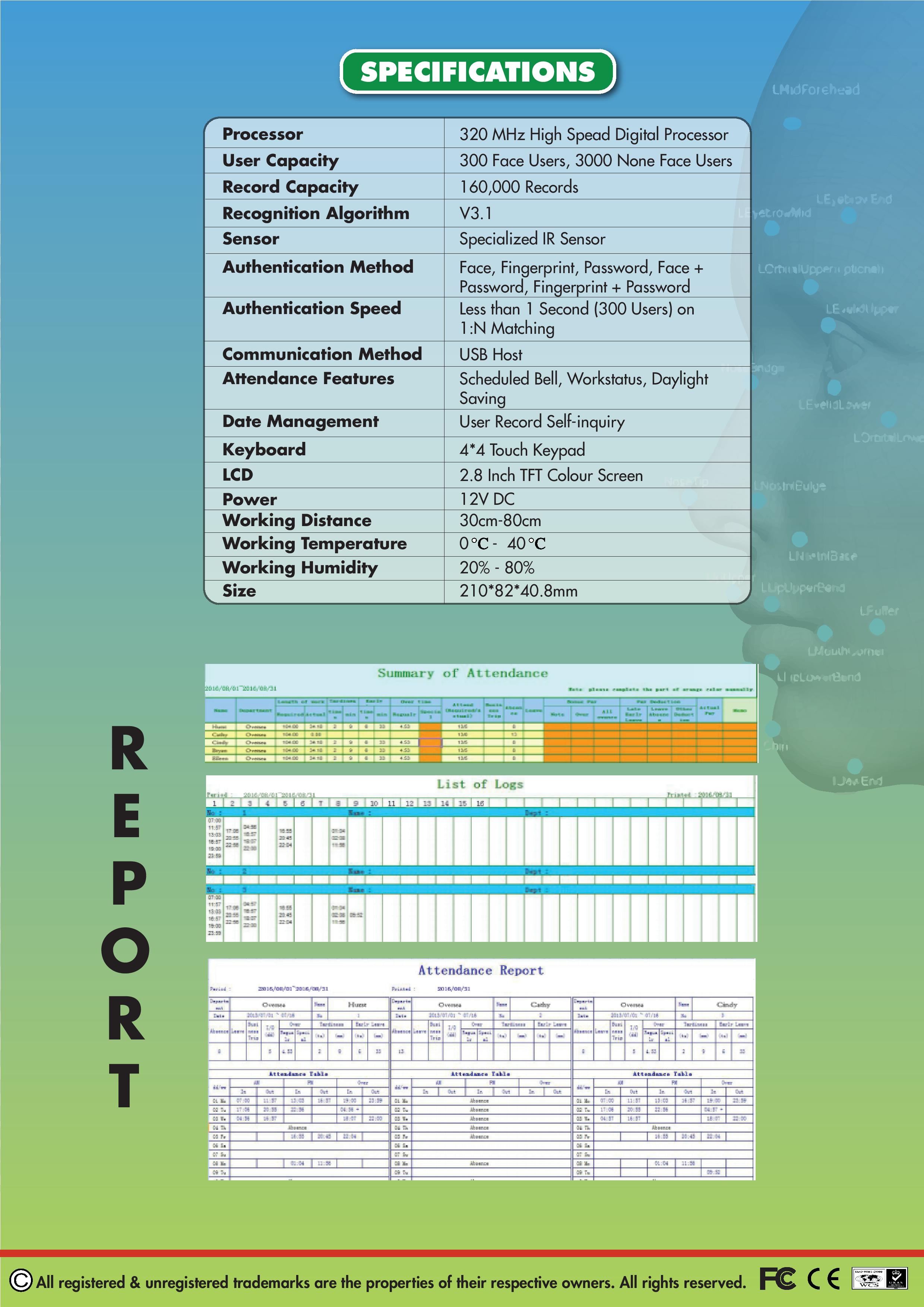WEMAX WE-68N Plus Face Recognition & Fingerprint Time Attendance System (Optional Software Reporting, WiFi Connection & Optional Cloud Based)
Specifications
Details
WEMAX Face Recognition & Fingerprint Time Attendance System
Model: WE-68N Plus
Features:
- NO software necessary (software as option - sold separately)
- Data export directly to Excel
- Stand-alone
- Automatic reporting system (ARS)
- NICD back-up battery to provide power supply not more than 1 hour during the blackout (sold separately)
Why Software Reporting?
- Able to cope with jobs that require to change shift frequently.
- HR is able to allocate each workers into their designated shifts and preset for their day-off.
- Able to calculate OT accurately
Remarks:
- Buyer will get 1nos Master Key & 1nos Time Management System CD installer if you choose for software reporting.
- Without software reporting, user has to download the data from the machine by using an USB-disk and open the file in PC via Microsoft Excel.
Cloud Based Features (Optional):
WiFi ConnectionA biometric fingerprint identification web based employee time clock that connects easily to the internet via WiFi or any wired router. Elimate ''buddy punching'' risk while simplifying your accounting and payroll.
Cloud System
Cloud based attendance system perfect for teams. Track work hours & break times. Monthly timesheets generated instantly. Easy payroll integration.
If you are interested in our cloud based attendance system, please contact us directly for further details.


What is Face Recognition?
Face recognition technology is the less intrusive and fastest biometric technology. It works with the most obvious individual identifier – the human face.
Instead of requiring people to place their hand on a reader (a process not acceptable in some cultures as well as being a source of illness transfer) or precisely position their eye in front of a scanner, face recognition systems unobtrusively take pictures of people’s faces as they enter a defined area. There is no intrusion or delay, and in most cases the subjects are entirely unaware of the process. They do not feel “under surveillance” or that their privacy has been invaded.
Technology
Facial recognition analyzes the characteristics of a person’s face images input through a digital video camera. It measures the overall facial structure, including distances between eyes, nose, mouth, and jaw edges. These measurements are retained in a database and used as a comparison when a user stands before the camera. This bio-metric has been widely, and perhaps wildly, touted as a fantastic system for recognizing potential threats (whether terrorist, scam artist, or known criminal) but so far has not seen wide acceptance in high-level usage. It is projected that bio-metric facial recognition technology will soon overtake fingerprint bio-metrics as the most popular form of user authentication.
Every face has numerous, distinguishable landmarks, the different peaks and valleys that make up facial features. Each human face has approximately 80 nodal points. Some of these measured by the Facial Recognition Technology are:
- Distance between the eyes
- Width of the nose
- Depth of the eye sockets
- The shape of the cheekbones
- The length of the jaw line
Currently gaining support as a potential tool for averting terrorist crimes, facial recognition is already in use in many law enforcement areas. Software has also been developed for computer networks and automated bank tellers that use facial recognition for user verification purposes.
Evaluation
One of the strongest positive aspects of facial recognition is that it is non-intrusive.Verification or identification can be accomplished from two feet away or more, and without requiring the user to wait for long periods of time or do anything more than look at the camera.
Face recognition is also very difficult to fool. It works by comparing facial landmarks – specific proportions and angles of defined facial features – which cannot easily be concealed by beards, eyeglasses or makeup.
How it Works
The following four-stage process illustrates the way bio-metric systems operate:
When the user faces the camera, standing about two feet from it. The system will locate the user’s face and perform matches against the claimed identity or the facial database. It is possible that the user may need to move and reattempt the verification based on his facial position. The system usually comes to a decision in less than 5 seconds.
View more about WEMAX WE-68N Plus Face Recognition & Fingerprint Time Attendance System (Optional Software Reporting, WiFi Connection & Optional Cloud Based) on main site




